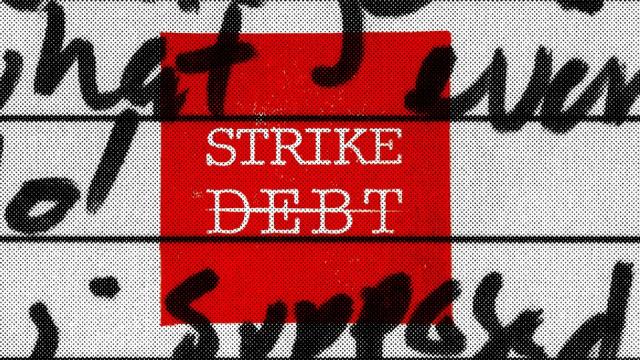
The debt forgiveness movement born out of Occupy Wall Street has entered a new stage in its activism around student loans. On Monday, a wing of the campaign known as Debt Collective announced a “debt strike” by 15 former students of the for-profit college chain Corinthian Colleges Inc.
The former students have said they will not repay any more of their student loans, in protest of what they describe as predatory lending practices on the part of both Corinthian Colleges and the U.S. Department of Education (DOE). Organizers working with Debt Collective said the coordinated action was a test run for larger debt refusal actions.
Debt Collective organizer Ann Larson compared the action to work stoppages conducted by the labor movement.
“This is the same kind of collective organizing,” she told Al Jazeera. “Collective bargaining can happen along economic lines when debtors join together."
For their test case, Debt Collective selected a particularly ripe target: Corinthian Colleges has already been the subject of both state and federal investigations regarding its lending practices. Since June 2014 the company has been under tight financial supervision from the DOE, which is shepherding it through the process of selling off some of its campuses and shutting down others.
Ann Bowers, 54, one of the former Corinthian students who is refusing to pay down her loans, told Al Jazeera she owes between $30,000 and $40,000 after three years in the Everest College system, which is owned by Corinthian. She earned her associate degree at Everest and had completed her first year in on an online bachelor's degree program when she found out that her school's parent company was in trouble with the DOE.
"I asked them about transferring," said Bowers, who lives in Fort Myers, Florida. "I went through the process with one school, and they didn't accept all of my credits. And I found out Everest had taken six years of my lifetime funding [in federal loan eligibility] in three years. I was devastated."
Bowers, who is disabled, said she has been unemployed for the year since she left Everest.
"I feel like the students are the ones suffering the consequences for what Corinthian did," she said. "It's not fair. And why isn't the Department of Education helping us? It's helping a school that even lied to them."
In October 2013, California sued Corinthian for allegedly misleading potential students as part of a “predatory scheme.” More recently, at the beginning of this month, the federal Consumer Financial Protection Bureau announced $480 million in debt relief for students who had “been harmed by Corinthian’s predatory lending scheme."
Debt Collective wants more relief, both from private and federal loans. The group has criticized the DOE for “coddling for-profit colleges” and dispatched protesters to department hearings to demand that it cancel the debt on federal loans owed by Corinthian attendees. If some private loans awarded to Corinthian students were predatory, Larson said, “then the federal loans are also predatory, and they should be canceled."
“The Department of Education’s job is to regulate higher education and how they’re treating students, and to regulate which colleges have access to student loan funds that are dispersed by the department,” she said. “Their job was to make sure this didn’t happen in the first place, that students were preyed on by a predatory lender."
Also on Monday, Rolling Jubilee, another arm of the same campaign as Debt Collective, said that it had purchased and canceled $13.4 million in debt, which organizers said would diminish the debt burdens of more than 9,400 people. That group was launched in 2012 with the intent of purchasing large amounts of student debt for pennies on the dollar and then refusing to collect on it.
As of the Friday before its announcement, the group had reported a total of $14.7 million in canceled debt, making the mass $13.4 million cancellation its largest haul by a wide margin.
Yet even several million dollars is a drop in the bucket compared to the total value of outstanding student loans in the United States. Last week, the Federal Reserve of New York issued a report finding that Americans now owe $1.16 trillion in student loans. Rolling Jubilee skeptics such as left-wing economics commentator Doug Henwood have asked whether a program of purchasing and forgiving debt can ever be more than “purely symbolic."
Laura Hanna, one of the activists behind the Rolling Jubilee, said that’s part of the reason why the campaign is shifting focus to debt strikes. “The Rolling Jubilee is an educational project,” she said. “It’s a tactic, not a solution. And our long-term project is collective organizing."
Neither Corinthian nor the DOE returned requests for comment.
3 WAYS TO SHOW YOUR SUPPORT
- Log in to post comments











